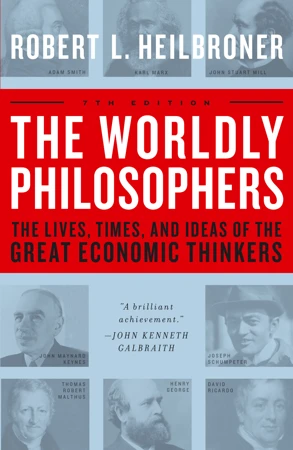The Worldly Philosophers – The Lives, Times And Ideas Of The Great Economic Thinkers

Blurb
The bestselling classic that examines the history of economic thought from Adam Smith to Karl Marx—“all the economic lore most general readers conceivably could want to know, served up with a flourish” (The New York Times). The Worldly Philosophers not only enables us to see more deeply into our history but helps us better understand our own times. In this seventh edition, Robert L. Heilbroner provides a new theme that connects thinkers as diverse as Adam Smith and Karl Marx. The theme is the common focus of their highly varied ideas—namely, the search to understand how a capitalist society works. It is a focus never more needed than in this age of confusing economic headlines. In a bold new concluding chapter entitled “The End of the Worldly Philosophy?” Heilbroner reminds us that the word “end” refers to both the purpose and limits of economics. This chapter conveys a concern that today’s increasingly “scientific” economics may overlook fundamental social and political issues that are central to economics. Thus, unlike its predecessors, this new edition provides not just an indispensable illumination of our past but a call to action for our future.
Comment from our editors:
Robert Heilbroner is one of the most prominent names in modern economics. As a student of Paul Sweezy, Heilbroner became known for his interdisciplinary and philosophical approach towards political economy, precisely (but accessibly) identifying implicit ideological biases and prescriptions of economic thoughts. Today, he lives on as the namesake of the Center for Capitalism Studies at the New School for Social Research. The Worldly Philosophers has been recommended to me by several of different mentors as one of best introductory books to political economy and the history of economic philosophy, and it truly is. Exploring the backgrounds and projects of notable political economists from Adam Smith to Karl Marx and beyond, this book provides an insightful overview of the theoretical evolution of economic thought. By outlining the ideological foundations, analytical syntheses, and critical departures of these worldly philosophers, Heilbroner reveals the tendencies and limits of economics but also its opportunities for young scholars.

